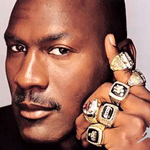“I would tell players to relax and never think about what’s at stake. Just think about the basketball game. If you start to think about who is going to win the championship, you’ve lost your focus.” – Micheal Jordan
 Some athletes experience gitters as early as the day prior to the game, others, on the morning of the game and most athletes experience gitters during the pre-game warm up.
Some athletes experience gitters as early as the day prior to the game, others, on the morning of the game and most athletes experience gitters during the pre-game warm up.
The time that athletes begin to experience the feelings and or thoughts that come about from gitters may differ but the reality is that all athletes experience them to one degree or another.
Another discrepancy between athletes is the state of their mind when choosing how to deal with their emotions, thoughts and any of the other physical manifestations which can be produced when experiencing pre-game gitters.
Any athlete that is aware of their basketball mental game will be better equipped in understanding and dealing with the cognitive and physical pitfalls associated with pre-game jitters and instead use them towards strengthening their mental toughness.
Basketball mental toughness usually has to be acquired by the vast majority of athletes; while maintaining and strengthening mental toughness is an on-going process that requires consistent work from the athlete.
Just what are pre-game gitters?
They are nothing more than the athlete’s mind priming the body for the imminent physical challenges it is going to face on the court. As the brain pumps the appropriate concoction of chemicals into the athlete’s bloodstream the side effects are what we commonly refer to as “butterflies” or “jitters”.
The most common signs are:
– A feeling coming from the stomach.
– An elevated heartbeat [i.e. feeling the heart pounding].
– Sweaty palms.
– An excited mind [i.e. jumping from one thought to another or focusing on things beyond personal control].
When an athlete is unaware of the body’s mechanisms these attributes can be mistaken as something being wrong. This interpretation leads to feelings of tension, fear and or anxiety. These are the very opposite of the mental states that an athlete needs to be in when being called into action.
Certain athletes end up carrying these feelings and thoughts into competition, resulting in potentially detrimental effects to their game. An athlete who carries tension, fear and anxiety onto the court will often find themselves freezing, their muscles tensing up and avoiding taking actions that may result in a failure.
This type of athlete is basically allowing a weak mindset to take hold of them.
With a little assistance and guidance from a knowledgably head coach, teammate or a mental game coach, athletes can be shown what to look out for, how to interpret their behaviour, how to calm their mind, how to focus on the essentials and how to come up with a personalized action plan that will help them in reaching their peak performance.
Download the free mental game assessment and get started on Improving your Mental Game in basketball

i also get sweaty palms and i focus on the other players not our team
Hey!
Learning to relax and getting into the zone is one of your keys to success!